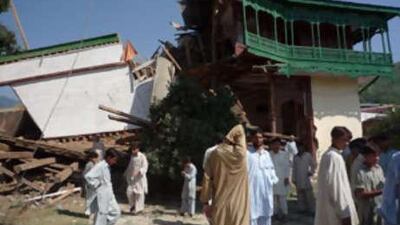Peshawar // The Pakistani army claimed to have killed more than 40 pro-Taliban militants yesterday as part of a reinvigorated campaign to establish the state's writ in the lawless tribal areas along the border with Afghanistan. Pakistan is facing political uncertainty after Nawaz Sharif, a former prime minister, withdrew his party from the coalition earlier this week. The coalition government had forced the resignation of Pervez Musharraf as president only a week earlier, stoking fears that Pakistan's efforts in the US-led "war on terror" would waver. However, the army under its new chief, Gen Ashfaq Kayani, who replaced Mr Musharraf when he retired as head of the military in November last year, has stepped up military operations in the tribal areas despite a backlash of suicide bombings. The first encounter yesterday started at midnight when pro-Taliban tribal fighters attacked a military post in South Waziristan, in the lawless Federally Administered Tribal Areas (FATA). An army spokesman said the attack was repulsed and that 11 insurgents were killed. The second incident occurred in Bajaur where the army has conducted intensive operations this month. "Our troops carried out an operation this morning, and we have reports that 30 militants, including some Uzbeks, were killed," said a military official, referring to a group of foreign fighters believed to have taken refuge along the Afghan-Pakistan border. Bureaucrats and officials in the North West Frontier Province who have responsibility for the tribal areas said they were optimistic the latest military operations signalled a new resolve among the senior army command to combat militancy. More recently, the Pakistan army and its paramilitary affiliates, which have lost over 1,500 men in the past five years in clashes with tribal militants and foreign fighters, have tried to strike peace deals with militants. "In the past they struck deals from positions of weakness," said Ghulam Qadir Khan, who is the civil servant in charge of law and order for the tribal areas. "But you saw last week when the militants in Bajaur tribal area sued for a ceasefire, the government declined as they are in a position of strength," he said. The adviser to the prime minister on interior affairs, the de facto interior minister, Rehman Malik, announced the refusal to agree to a ceasefire earlier this week. Mr Malik said the government would only hold talks with militants willing to lay down their arms. The United States has expressed its displeasure with previous peace agreements struck in the tribal areas of North and South Waziristan, areas considered by US intelligence to be Taliban and al Qa'eda sanctuaries. The US military said the peace agreements had led to a tripling of cross-border infiltration of militants from Pakistan to Afghanistan, and it had given the militants time to regroup after the US-led invasion of Afghanistan in 2001. Mr Khan said the military operation in Bajaur was launched earlier this month after several hundred pro-Taliban militants laid siege to a strategic outpost for three days. The three-week-old military offensive has left more than 500 fighters dead, according to the government, and 260,000 people have fled from the fighting, creating a refugee crisis in neighbouring areas. US and Afghan officials claim the Taliban and al Qa'eda are using sanctuaries in Bajaur to train, regroup and launch attacks on American and Afghan forces in eastern Afghanistan. A US missile strike on Damadola in Bajaur in 2006 reportedly targeted, but missed, al Qa'eda's second in command, Ayman al Zawahiri. But the military operation in Bajaur has revived sceptical voices from local journalists and those displaced by the fighting. They contend that despite the army's claims of killing militants, its bombing has not targeted them and only been conducted to appease Washington. Like many officials in the border region, few locals take the "war on terror" at face value and believe it to be a "great game" played for strategic value. Nevertheless, yesterday's fighting in Bajaur broke out when troops supported by Cobra helicopter gunships and artillery fired on militants who had based themselves in a health centre. In Swat, near Bajaur, in an area just outside the tribal belt, Taliban militants killed three local political workers. Earlier in the week, three relatives of a member of the North West Frontier Province's assembly were shot dead in the valley. The province's ruling Awami National Party (ANP) had called for renewed military action in Swat last month after a peace agreement broke down. "It became obvious to us that the people who were leading the peace talks for the militants were not the commanders," said Jaffar Shah, an ANP member of the provincial assembly who took part in the talks. "We do not know who are the real commanders." Despite a military presence, Swat, a picturesque valley that was until recently a popular tourist destination, remains blighted by militant attacks and a campaign of intimidation. "There are seven members of the provincial assembly in Swat. They have put a bounty on each of our heads," said Mr Shah. @Email:iwilkinson@thenational.ae

Pakistan kills 40 Taliban in renewed offensive
As the country faces political uncertainty, the army has set its crosshairs on the tribal region by increasing operations despite recent bombings.
Most popular today
